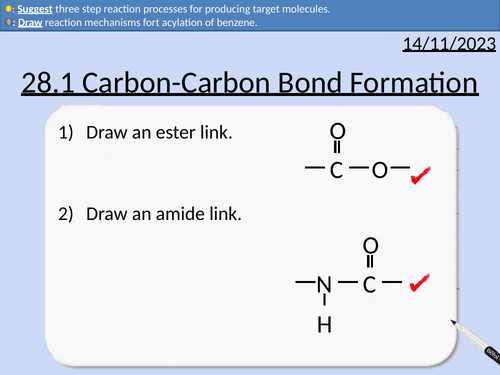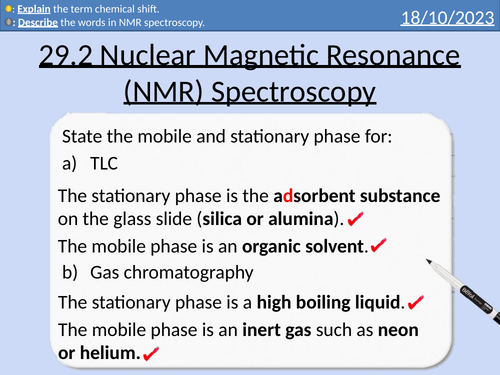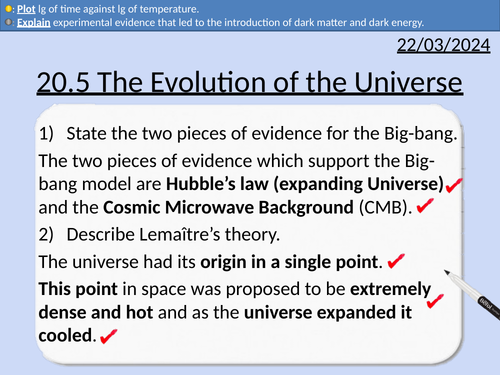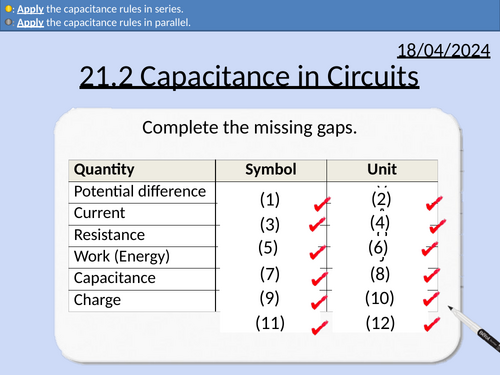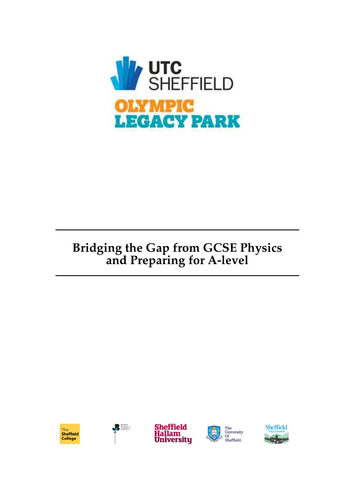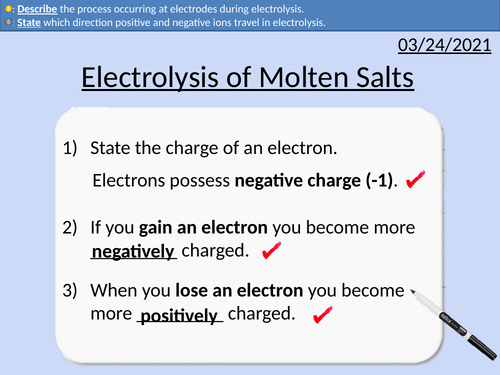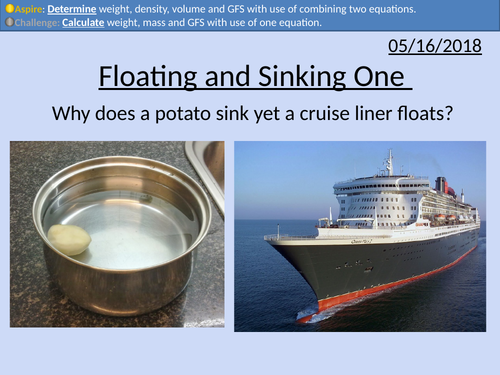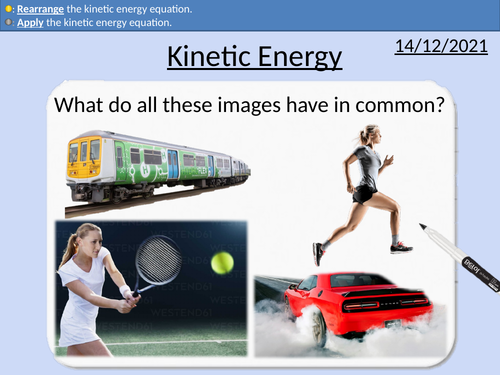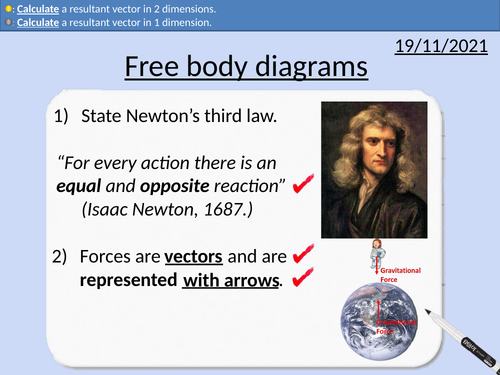496Uploads
163k+Views
70k+Downloads
All resources

A level Chemistry: Carbon-Carbon Bond Formation
This PowerPoint is a whole lesson included with student activities, animated answers, homework questions with answers provided.
This lesson covers:
Forming nitriles from haloalkanes
Forming nitriles from aldehydes and ketones
Forming amines from nitriles (reduction)
Forming carboxylic acids from nitriles (hydrolysis)
Friedel-Crafts alkylation of benzene
Acylation of benzene with acyl chloride

GCSE Physics: Sound, Boundaries and Ultrasound
This presentation covers OCR Gateway Physics 9-1 P5.1.3 Sound Properties and Uses. Includes student activities and full worked answers.
Ray diagrams
Absorption, reflection and transmission
Sonar
Ultrasound
Rearranging equation
Refraction
Relationship between wave speed and wavelength
Data analysis

A level Chemistry: Nuclear Magnetic Resonance (NMR) Spectroscopy
OCR A level Chemistry: 29.2 Nuclear Magnetic Resonance (NMR) Spectroscopy
This PowerPoint is a whole lesson included with student activities, animated answers, homework questions with answers provided.
This lesson covers:
Nuclear Spin
Resonance
Tetramethylsilane (TMS)
Chemical Shift ẟ

OCR A level Physics: Evolution of the Universe
OCR A level Physics: 20.5 Evolution of the Universe
Module 5 Newtonian World and Astrophysics
This PowerPoint is a whole lesson included with student activities, animated answers, homework questions with answers provided.
This lesson covers:
The evolution of the Universe from the Big-bang to 13.7 billion years later
The composition of the Universe
Experimental evidence for dark matter
Experimental evidence for dark energy

GCSE OCR Physics 9-1 Paper 1 Revision Booklets
OCR GCSE Physics Paper 1 for higher tier (triple and combined) are covered with individual revision booklets.
Each booklet has:
Link to specification number
Denotes if it is higher or combined material
Equations to recall and apply for that section
Equations to apply for that section
Key Points
Exam questions
Mark Schemes for each question
Triple Booklets:
P1.1 The Particle Model
P1.2 Changes of State
P1.3 Pressure
P2.1 Motion
P2.2 Newton’s Laws
P2.3 Forces in action - Simple Machines
P2.3 Forces in action - Springs and Gravitational Energy
P3.1/2 Electricity
P4.1 Magnetism
P4.2 Uses of Magnetism
Combined Booklets:
P1.1 The Particle Model
P1.2 Changes of State
P2.1 Motion
P2.2 Newton’s Laws
P2.3 Forces in action - Springs and Gravitational Energy
P3.1/2 Electricity
P3.3 Magnetism and Fields

GCSE OCR Physics 9-1 Paper 2 Revision Booklets
OCR GCSE Physics Paper 2 for higher tier (triple and combined) are covered with individual revision booklets.
Each booklet has:
Link to specification number
Denotes if it is higher or combined material
Equations to recall and apply for that section
Equations to apply for that section
Key Points
Exam questions
Mark Schemes for each question
Triple Booklets:
P5.1 Wave Beahviour and Wave Velocity
P5.2 Electromagnetic Waves
P5.3 Wave Interactions
P6.1 Radioactive Emissions
P6.2 Uses and Hazards - Fusion and Fission
P7 Energy
P8.1 Physics on the move
P8.2 Powering Earth
P8.3 Beyond Earth
Combined Booklets:
P4.1 Wave Beahviour and Wave Velocity
P4.2 Electromagnetic Waves
P4.3 Radioactice Emissions
P6 Energy
P6.2 Physics on the move
P6.3 Powering Eaerth

OCR A level Physics: Capacitors in Circuits
OCR A level Physics: 21.2 Capacitors in Circuits
Module 6 Particles and Medical Physics
This PowerPoint is a whole lesson included with student activities, animated answers, homework questions with answers provided.
This lesson covers:
Uses of capacitors in circuits.
Rules for capacitors in parallel (potential difference, charge, and capacitance).
Rules for capacitors in series (potential difference, charge, and capacitance).
Applying the rules in series and parallel.
Creating a circuit to calculate the charge stored on the capacitor.

OCR A level Physics: Uses of capacitors
OCR A level Physics: 21.5 Charging Capacitors
Module 6 Particles and Medical Physics
This PowerPoint is a whole lesson included with student activities, animated answers, homework questions with answers provided.
This lesson covers:
Calculating power output from a circuit containing a capacitor
A rectifier circuit - changing an alternating input to a smooth output

OCR A level Physics: Radioactivity
OCR A level Physics: 25.1 Radioactivity
Module 6 Particles and Medical Physics
This PowerPoint is a whole lesson included with student activities, animated answers, homework questions with answers provided.
This lesson covers:
Types of ionising radiation (alpha, beta-plus/beta-minus, gamma)
Penetration power and ionising power
Detecting radiation with a Geiger (GM tube) counter
Background radiation and correct count rates
Electric and magnetic fields affect ionising radiation
Cloud chambers

OCR A level Physics: Binding Energy
OCR A level Physics: 26.2 Binding Energy
Module 6 Particles and Medical Physics
This PowerPoint is a whole lesson included with student activities, animated answers, homework questions with answers provided.
This lesson covers:
Definition of mass defect
Definition of binding energy
Binding energy per nucleon
Calculating mass defect, binding energy, and binding energy per nucleon.
Explaining nuclear stability

OCR A level Physics: Radioactive Decay Calculations
OCR A level Physics: 25.4 Radioactive Decay Calculations
Module 6 Particles and Medical Physics
This PowerPoint is a whole lesson included with student activities, animated answers, homework questions with answers provided.
This lesson covers:
Decay constant and half-life
Using exponentials to calculate activity and number of nuclei present
Solving Differential Equations (beyond A-level Physics course)

GCSE to A level Physics: Bridging the Gap
A short booklet of questions for students to solve over the summer between GCSE and A level.

GCSE Chemistry: Electrolysis of molten salts
This PowerPoint presentation with worked examples and student questions covers:
• Naming electrolysis experimental set up
• PANIC convention for electrodes
• Electron transfers at electrodes
• Half-equations for anode and cathode

OCR AS Physics: LDR
OCR AS Physics: LDR is a part of the Module 4: Electrons, Waves, and Photons. PowerPoint with worked examples and homework.
Materials and uses of LDRs
Creating an experiment to understand LDRs
LDRs relationship with light intensity

GCSE Physics: Resistance and Ohm's Law
This presentations covers the OCR Gateway Physics 9-1 P3.2.3 Resistance
Combining resistors in series
Combining resistors in parallel
Modeling resistance, current, and potential difference with a rope.
The relationship between potential difference and current
The relationship between resistance and current
Ohm’s law
Rearranging equations
Worked examples and student questions
Explaining how increasing current increases resistance in a metal conductor and filament lamp.

GCSE Physics: Floating and Sinking
This presentation covers OCR Gateway Physics 9-1 P1.3.5 Floating and Sinking
Content Covered:
Balanced Forces
Rearranging equations
Mass and weight
Gravitational field strength
Pressure
Liquid Pressure
Difference in pressure causing up thrust
Combining two equations
Worked solutions
Exam Style Questions
Problems with answers
Demonstration

GCSE Physics: Distance-time Graphs
This presentation covers OCR Gateway Physics 9-1 P2.1.4.
Plotting of distance-time graph
Plotting of displacement-time graph
Worked example for determining gradient of a line
Comparing distance-time and displacement-time graphs

GCSE Physics: Kinetic Energy
This presentation covers OCR Gateway Physics 9-1 P2.1.6
Kinetic equation
Rearranging equations with three different methods.
Plotting velocity vs kinetic energy
Evaluating square relationships
Worked problems with solutions
Student problems with solutions

GCSE Physics: Free Body Diagrams
This presentation covers GCSE Physics OCR Gateway P2.2.2
Vector Addition 1D
Vector Addition 2D - scaled drawings
Vector Addition 2D - finding angles with a protractor
Resultant vectors and acceleration
Student problems with answers.

GCSE Physics: Kinetic and Gravitational Energy
This presentation covers OCR Gateway Physics 9-1 P7.1.6 Kinetic and Gravitational Energy
Rearranging Gravitational and Kinetic Energy Equations
Energy Transfers and conservation of energy
Historical Development of physics and pendulums
Creating an experiment to prove conservation of energy
Exam question with worked solutions
Practice questions with worked solutions

